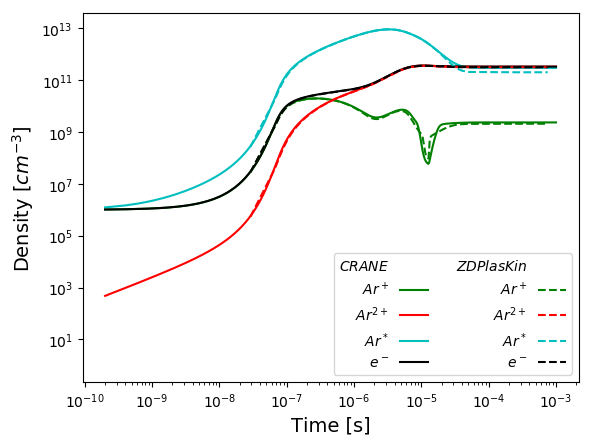Argon Microdischarge
This example is based on a ZDPlasKin example of an argon microdischarge at atmospheric pressure (Pancheshnyi et al., 2008). The model includes five species: Ar, Ar, Ar, Ar, and electrons. The number density versus time is shown in the plot below, with ZDPlasKin's results for comparison.
The reactions are included in the input file as shown below:
[ChemicalReactions]
[./ScalarNetwork]
species = 'e Ar* Ar+ Ar Ar2+'
reaction_coefficient_format = 'rate'
file_location = 'Example3'
# These are parameters required equation-based rate coefficients
equation_constants = 'Tgas J pi'
equation_values = '300 2.405 3.141'
equation_variables = 'Te'
rate_provider_var = 'reduced_field'
sampling_variable = 'reduced_field'
reactions = 'e + Ar -> e + e + Ar+ : EEDF
e + Ar -> Ar* + e : EEDF
e + Ar* -> Ar + e : EEDF
e + Ar* -> Ar+ + e + e : EEDF
Ar2+ + e -> Ar* + Ar : {8.5e-7*((Te/1.5)*11600/300.0)^(-0.67)}
Ar2+ + Ar -> Ar+ + Ar + Ar : {(6.06e-6/Tgas)*exp(-15130.0/Tgas)}
Ar* + Ar* -> Ar2+ + e : 6.0e-10
Ar+ + e + e -> Ar + e : {8.75e-27*((Te/1.5)^(-4.5))}
Ar* + Ar + Ar -> Ar + Ar + Ar : 1.399e-32
Ar+ + Ar + Ar -> Ar2+ + Ar : {2.25e-31*(Tgas/300.0)^(-0.4)}
e -> W : {1.52*(760/100)*(Tgas/273.16)*(Te/1.5)*((J/0.4)^2 + (pi/0.4)^2)}
Ar+ -> W : {1.52*(760/100)*(Tgas/273.16)*(Te/1.5)*((J/0.4)^2 + (pi/0.4)^2)}
Ar2+ -> W : {1.52*(760/100)*(Tgas/273.16)*(Te/1.5)*((J/0.4)^2 + (pi/0.4)^2)}'
[../]
[]
Rate coefficients are separated from the reaction notation by a colon character. If a rate coefficient is enclosed in brackets, it will be added as a parsed function. (Note that this may incur a slight performance penalty, but the benefit is that any functional form may be included.) Variables that are added as constants inside the function must be noted with the equation_values parameter, and the values assigned with equation_values. Any nonlinear or auxiliary variables must be specified with the equation_constants parameter.

Argon species and electrons versus time. Solid lines are computed by CRANE, dotted lines by ZDPlasKin.
The profiles are not identical. The main difference between ZDPlasKin and CRANE is that a Boltzmann solver is not dynamically coupled to CRANE, but BOLSIG+ is coupled and run with ZDPlasKin. Instead, electron-impact rate coefficients are tabulated prior to runtime.
References
- Sergey Pancheshnyi, Benjamin Eismann, Gerjan Hagelaar, and Leanne Pitchford.
ZDPlasKin: a new tool for plasmachemical simulations.
In The Eleventh International Symposium on High Pressure, Low Temperature Plasma Chemistry (HAKONE XI). Oleron Island, France, September 2008.[BibTeX]